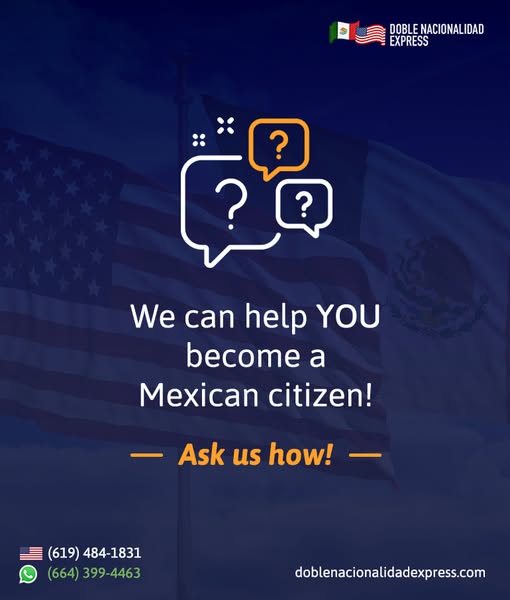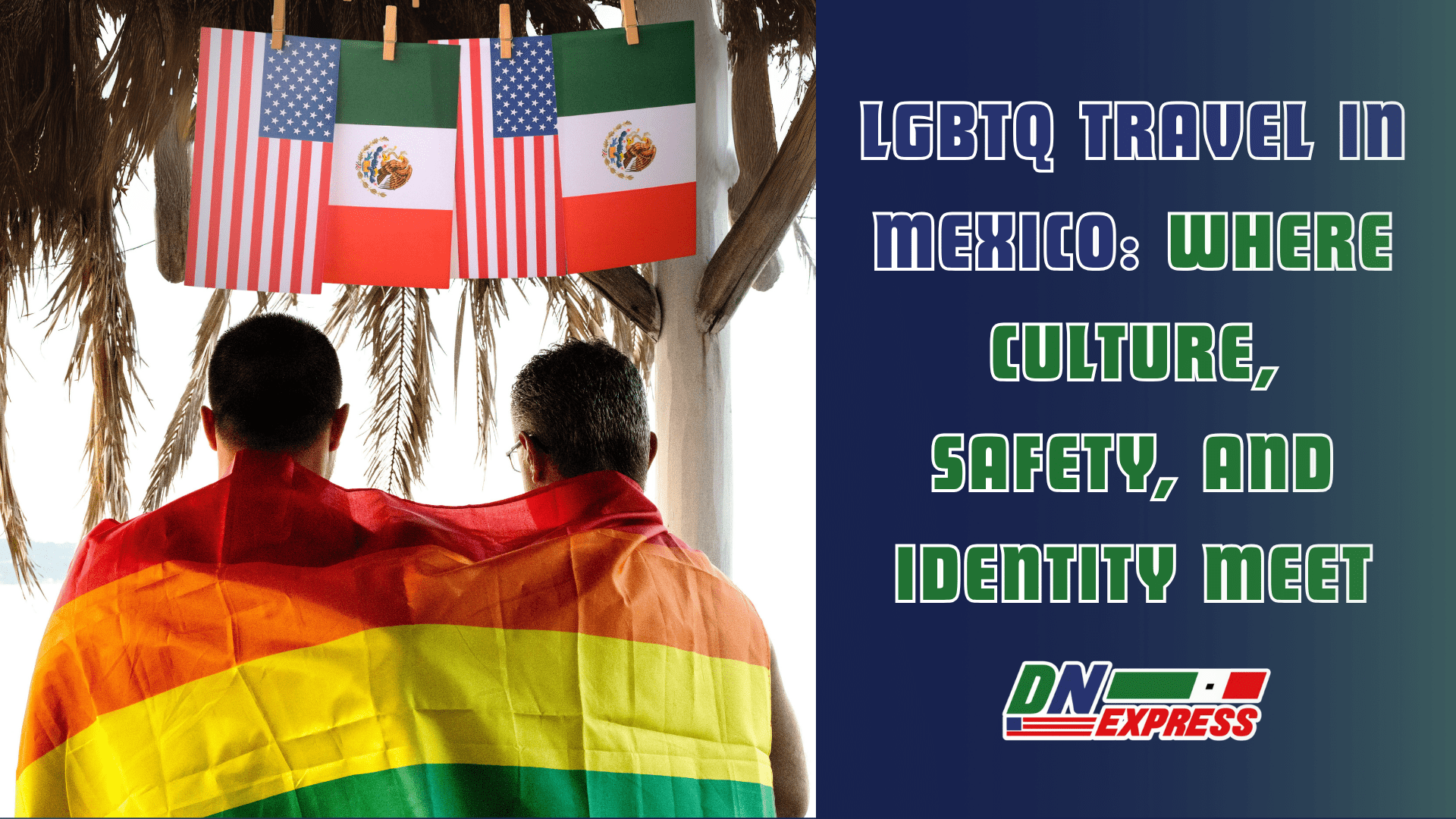Mexico is one of the most LGBTQ-friendly countries in Latin America, offering legal protections, inclusive cities, and vibrant queer culture. From Mexico City's Zona Rosa to Puerto Vallarta's rainbow-lined beaches, LGBTQ+ travelers find community, romance, and safety.
Whether you're planning a honeymoon in Tulum, searching for a queer-friendly surf town, or reconnecting with your Mexican heritage through dual citizenship, Mexico offers a powerful mix of safety, affordability, and belonging.
Some visitors come for the beaches, others come to change their lives.
If you're looking for a travel experience that respects your identity and supports your legal goals, we can help.
We specialize in helping LGBTQ+ travelers correct documents, register Mexican citizenship, and feel fully seen on both sides of the border.
Want to see how it all works? We'll walk you through the best destinations, legal tips, and what makes Mexico so affirming for queer travelers.
How LGBTQ Travel Differs Depending on Your Situation
LGBTQ+ travelers don't all come to Mexico for the same reason.
For some, it's a chance to reconnect with family. For others, it's about fixing documentation, securing dual citizenship, or registering a loved one.
Here's how your experience might look depending on your background:
U.S.-Born Children of Mexican Parents
If you were born in the U.S. to Mexican parents, traveling to Mexico can feel like reclaiming a part of yourself. For many queer adults, it's an emotional return to the land their parents left behind, only now, they're doing it on their own terms.
Cities like Oaxaca and Mexico City are especially popular. They offer both legal resources and rich queer culture with warm acceptance.
We help U.S.-born Mexicans claim their rightful nationality without needing to step foot in the consulate.
Adults Who Were Never Registered in Mexico
If your birth was never officially registered in Mexico, this situation affects many clients we serve.
LGBTQ+ adults in their 30s, 40s, and 50s are discovering that reclaiming Mexican citizenship is possible, even decades later.
While exploring vibrant, inclusive cities like Guadalajara or Mérida, travelers can also take steps to fix their paperwork. This process often begins with correcting names, filing late registrations, or recovering lost documents. We're here to make it feel possible.
Parents Applying for Their U.S.-Born Kids
Many queer families want their children to grow up with dual nationality, especially if one or both parents are Mexican citizens.
We've worked with LGBTQ+ couples who visit Puerto Vallarta or Merida, family-friendly destinations with growing queer visibility.
They come for the beach and to start paperwork for their kids' future. Legal citizenship opens doors to education, healthcare, and the right to live in Mexico long-term.
We can guide families through this process without ever visiting a consulate.
People Correcting Documents to Qualify
If you've been denied before because of mismatched names, missing records, or other errors, don't give up. LGBTQ+ travelers often face document issues due to past discrimination or systemic bureaucracy.
The good news? You can fix them.
Whether you're relaxing in Tulum or enjoying Pride in Mexico City, your trip can also become an opportunity to get your paperwork back on track. Our legal team helps you correct documents safely, affordably, and with the discretion you deserve.
Mexican Nationals Helping Spouses or Parents
If you're already a Mexican citizen, your travel might be focused on helping someone else. This could mean registering your U.S.-born spouse or aging parent.
We see many LGBTQ+ couples and intergenerational families taking this step together. Cities like Oaxaca and CDMX offer both legal infrastructure and strong LGBTQ+ communities, making the journey feel less isolating.
We can support you in handling the legal details while you focus on the people you love.
Is Mexico Safe for LGBTQ+ Travelers?
Yes, Mexico is one of the most LGBTQ-friendly countries in Latin America, especially in tourist zones. In cities like Puerto Vallarta and Mexico City, queer travelers report feeling safe showing affection in public, attending Pride events, and engaging openly with the community.
Local businesses display pride flags year-round. Hospitality workers are often proactive allies.
That said, safety levels can vary by region. In more conservative or rural areas, it's wise to be mindful of local customs, especially when it comes to public displays of affection.
Standard precautions like traveling in groups, avoiding isolated areas at night, and choosing LGBTQ-affirming accommodations still apply.
Does Mexico Recognize LGBTQ+ Rights?
Yes. Mexico has made major legal strides in LGBTQ+ equality.
Same-sex marriage is legal in all 32 states, and transgender individuals can update their gender markers on official documents.
Anti-discrimination protections are also written into law. However, how they're enforced can vary depending on local authorities.
Key legal highlights:
- Same-sex marriage is fully legal across Mexico.
- Gender identity changes are allowed on birth certificates and ID.
- Adoption rights are recognized for same-sex couples in many states.
- Public institutions are increasingly offering gender-neutral services.
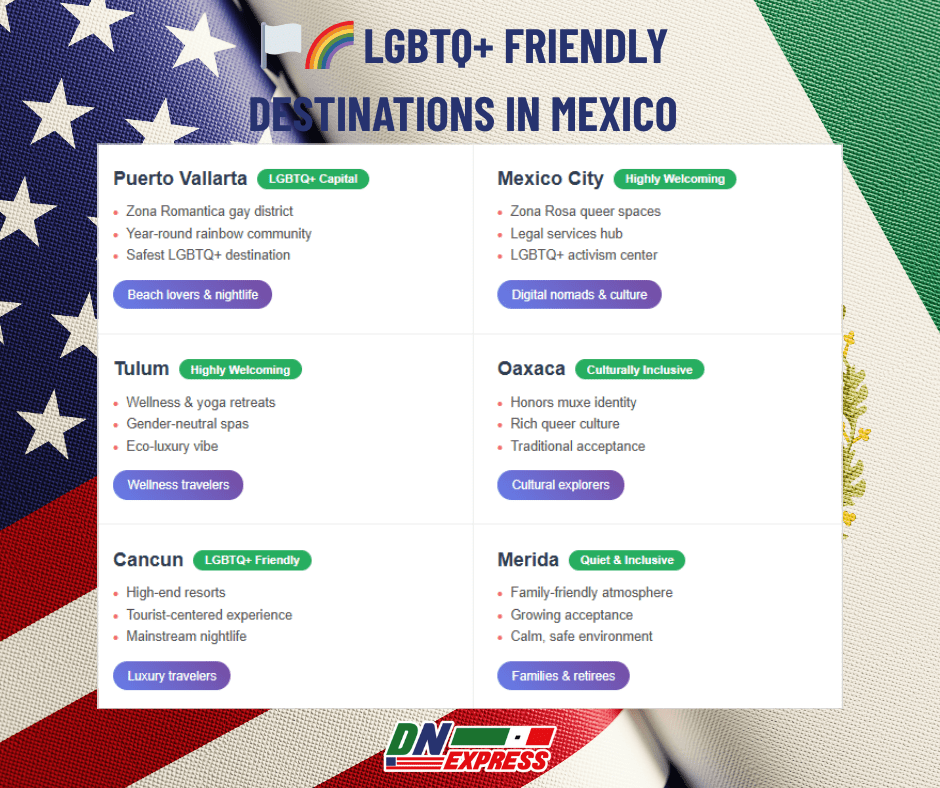
LGBTQ+ Friendliness by Destination
Wondering where to go? Here's how popular cities and regions stack up for LGBTQ+ travelers based on official tourism information:
Cancun
Yes, LGBTQ-friendly. Cancun offers high-end resorts and a tourist-centered experience.
While the nightlife scene is mainstream rather than explicitly queer, many resorts proudly welcome LGBTQ+ guests and host couples with ease.
Cozumel
Quiet but inclusive. While Cozumel doesn't have a large gay bar scene, it's known for being low-key and safe.
Resorts tend to be respectful. Travelers report positive experiences with staff and services.
Riviera Maya (Tulum, Playa del Carmen)
Highly LGBTQ-welcoming. Tulum is especially popular with queer wellness travelers thanks to its yoga retreats, gender-neutral spas, and eco-luxury vibe.
Playa del Carmen offers lively nightlife and access to beach clubs.
Puerto Vallarta
The undisputed LGBTQ capital of Mexico. Zona Romantica is full of gay beach clubs, queer-owned hotels, drag shows, and a visible year-round community.
It's the safest and most vibrant LGBTQ+ destination in the country.
Oaxaca
Culturally inclusive, socially complex. Oaxaca honors the muxe identity, recognized as a third gender in Zapotec culture. This brings deep cultural value to queer travelers.
Still, PDA should be subtle in rural or traditional areas.
Mexico City
A queer cultural and legal hub. Zona Rosa is known for its nightlife and openly queer spaces.
The city also leads in legal services for name changes, gender marker updates, and LGBTQ activism. It's one of the most affirming cities for LGBTQ+ digital nomads and travelers.
Guadalajara
Underrated and evolving. Guadalajara's LGBTQ+ scene is growing fast with vibrant festivals, queer bars, and a youthful crowd.
While it's not internationally known, it has a strong, local queer community.
Merida
Quiet and inclusive. Merida is increasingly chosen by queer families and retirees.
It's clean, calm, and culturally rich, making it an ideal hub for LGBTQ+ travelers seeking a slower pace.
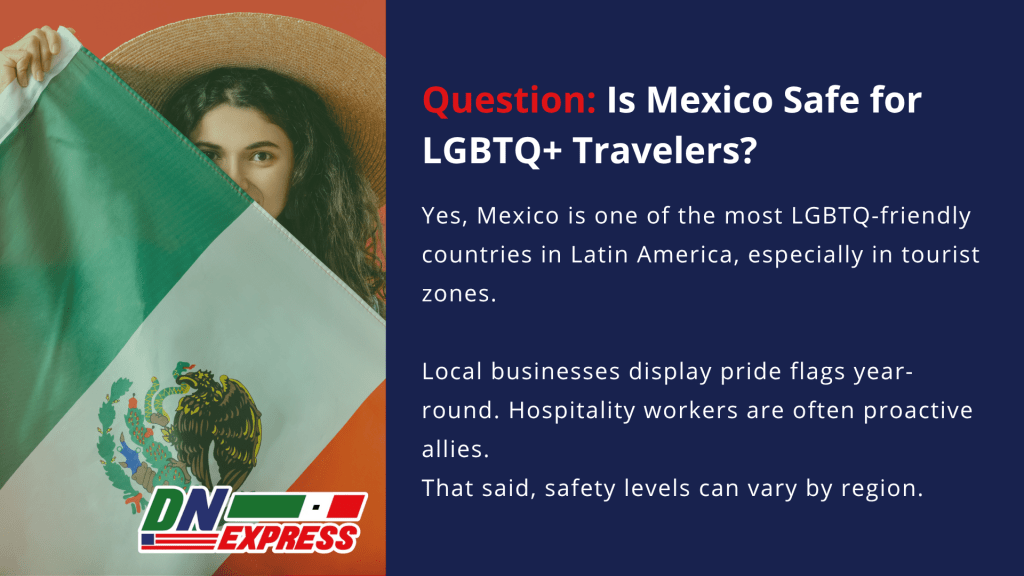
Frequent Concerns (And How to Solve Them)
Even in a country as inclusive as Mexico, LGBTQ+ travelers naturally have concerns. Here are the most frequent ones and how to confidently navigate them.
Fear of PDA Backlash
Solution: Stick to LGBTQ+ safe zones like Zona Romantica in Puerto Vallarta or Zona Rosa in Mexico City, where public affection is celebrated, not judged. In conservative or rural areas, discretion may still be wise.
You'll rarely encounter direct hostility in tourist hubs.
Intercity Travel Safety
Solution: Intercity travel is generally safe, especially with major bus companies like ADO or private airport transfers. Still, it's smart to use ride-share apps or guided shuttles, and avoid traveling through rural highways at night.
Travelers in the LGBTQ+ community often feel more comfortable in group tours or scheduled services.
Language Concerns
Solution: Most tourist-facing businesses speak at least basic English. Still, when it comes to legal documents or sensitive personal matters, it helps to have bilingual support.
We offer full English-Spanish assistance, so nothing gets lost in translation, whether you're at the registry office or on a Zoom call.
Medical or Legal Discrimination
Solution: Use known LGBTQ+-affirming medical clinics and legal firms, especially if you're trans, nonbinary, or seeking gender-affirming care. In cities like Mexico City and Guadalajara, these services are available and respected.
We work with inclusive legal teams who respect your rights and your identity.
Lack of Queer Community in Small Towns
Solution: Some smaller towns may not have a visible LGBTQ+ presence. If community connection matters to you, center your travel around cities first. Then use Reddit, Facebook groups, or queer travel apps to scout welcoming spots nearby.
Many travelers report finding unexpected allies and events in off-the-map destinations with a little research.
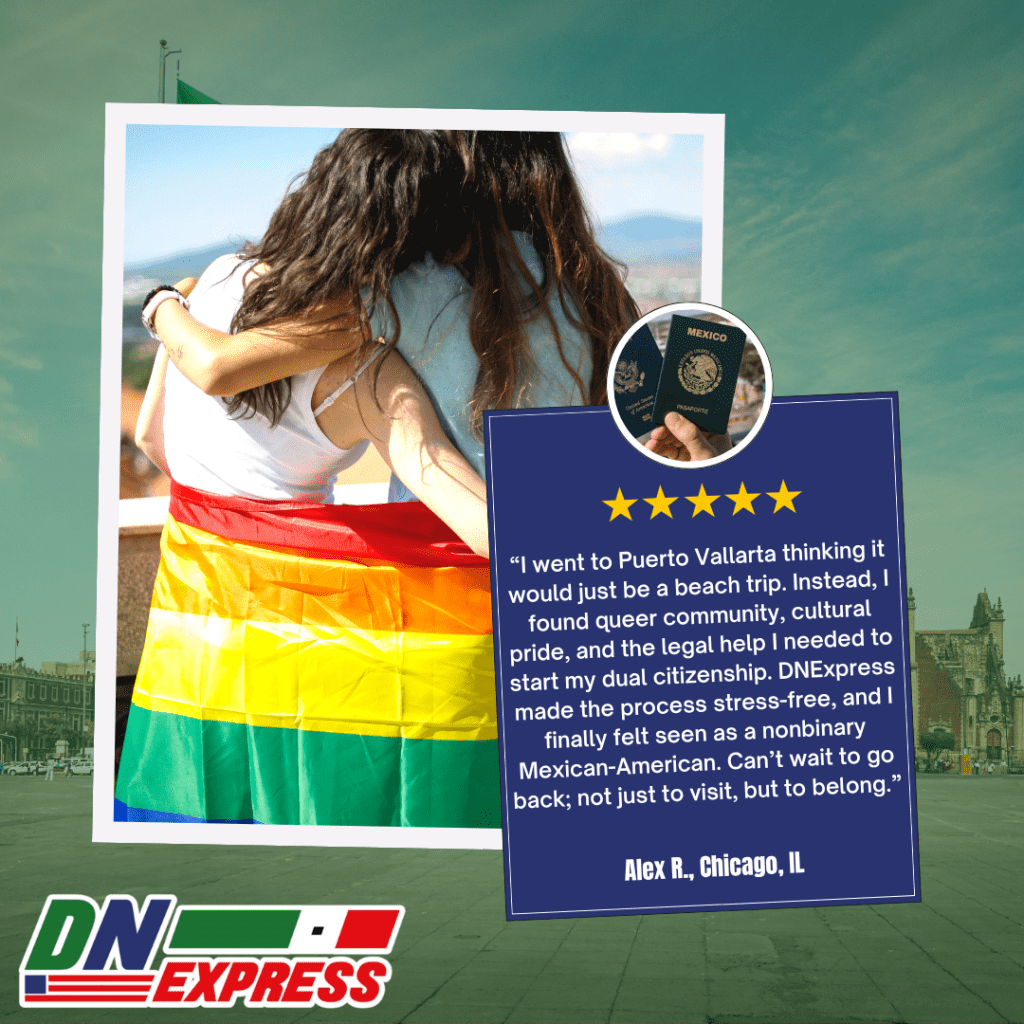
Why Work with Doble Nacionalidad Express?
For many LGBTQ+ travelers, a trip to Mexico goes beyond vacation. It's a turning point. Whether you're reclaiming your identity, correcting old documents, or registering a loved one's nationality, the process can feel overwhelming.
That's where Doble Nacionalidad Express steps in.
We offer LGBTQ-affirming, consulate-free legal services for travelers who want clarity, discretion, and respect.
What We Specialize In
✅ Helping queer Americans reclaim Mexican nationality
✅ Guiding same-sex couples through legal marriage or parental registrations
✅ Fixing document errors after years (or decades) of being denied
✅ Supporting trans and nonbinary clients through gender-corrected paperwork
✅ Offering full bilingual support, so language never becomes a barrier
Benefits of DNExpress help
- No consulate visits required
- Private, personalized legal guidance
- All communication in English and Spanish
- Proven track record with complex and previously rejected cases
We believe identity is sacred. Paperwork shouldn't get in the way of claiming yours.
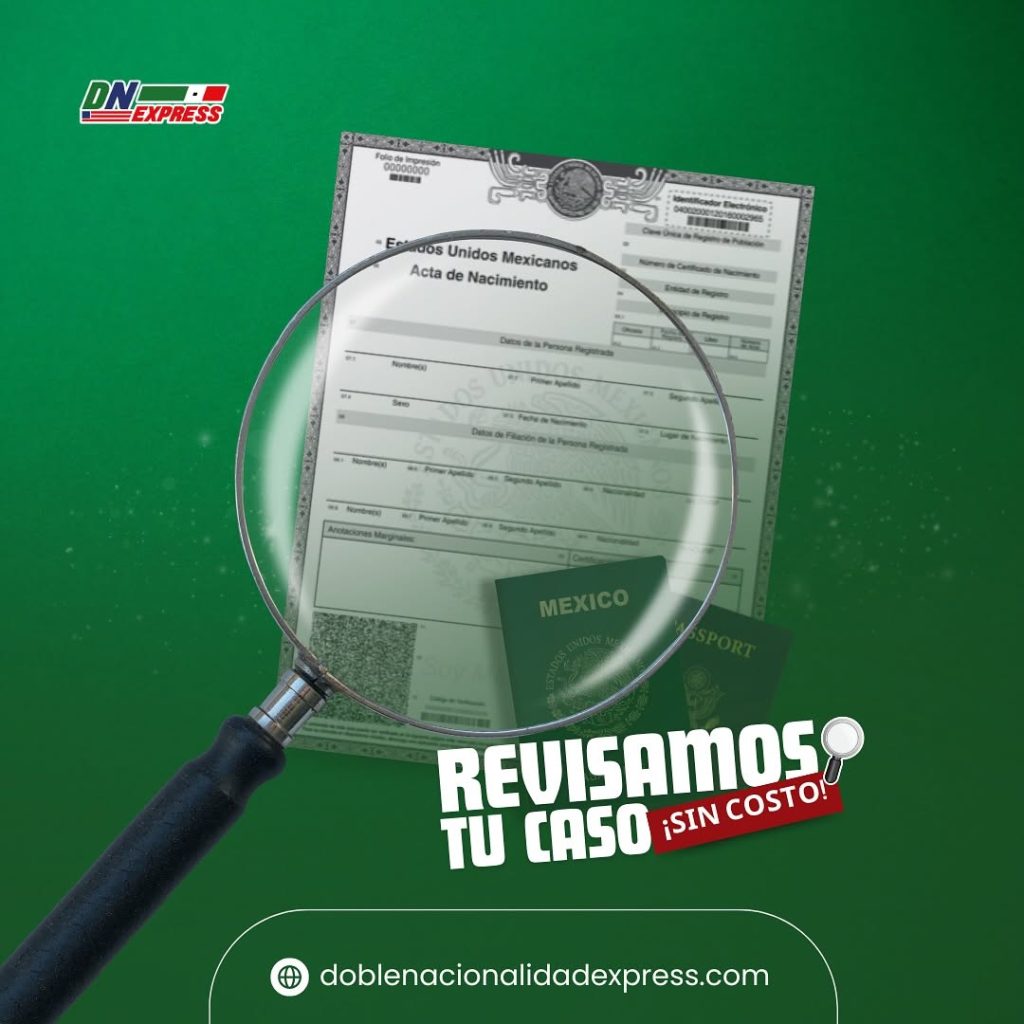
Why Going It Alone Carries Unnecessary Risk
❌ Long delays or rejections at the consulate
❌ Language barriers that stall or derail your case
❌ Discrimination or lack of sensitivity in government offices
❌ No guarantee of success without professional legal backing
Your future deserves better than bureaucracy. Let us help you move forward safely, confidently, and fully affirmed.
LGBTQ+ travel in Mexico offers far beyond beaches and fiestas. It's about belonging to a culture, to your roots, to yourself.
Whether you're here for sun and celebration, or you're taking the first steps toward dual citizenship, document correction, or family registration, this journey is deeply personal.
And you don't have to do it alone.
If your trip goes beyond vacation, if it's about identity, legacy, or love, then we are here to help. We make the legal path easier, safer, and more affirming, so you can focus on what matters most: being seen, supported, and celebrated.
For questions about your specific situation, check our frequently asked questions.
Schedule a Free Case Review o Message Us on WhatsApp
Questions LGBTQ+ Travelers Are Asking
Can I Travel with My Partner Without Hiding Our Relationship?
Yes, absolutely. In cities like Puerto Vallarta, Mexico City, Tulum, and Merida, LGBTQ+ couples are welcomed with open arms. Holding hands, sharing a meal, or checking into a hotel as a couple is routine and comfortable in most tourist areas.
That said, in smaller towns or rural zones, discretion may still be a practical choice due to lingering social conservatism.
Is Intercity Travel Safe for Queer Couples?
For the most part, yes. Bus companies and airport shuttles in cities like CDMX, Guadalajara, and Puerto Vallarta are safe and professional.
We do recommend choosing well-known transportation providers and avoiding late-night travel through unfamiliar or remote areas.
For added comfort, many LGBTQ+ travelers opt for private car services or ride-share apps when moving between cities.
Are There LGBTQ-Friendly Hiking or Nature Tours?
Yes, and they're becoming popular each year. Destinations like Oaxaca, Sayulita, and the Yucatán Peninsula are attracting queer nature lovers with hiking trails, cenote tours, and eco-retreats.
Some tour guides and retreat centers explicitly market themselves as LGBTQ-inclusive, offering everything from surf camps to jungle yoga without judgment.
Can I Combine Travel with Legal Help for Correcting Documents?
You can, and many do. We offer services designed exactly for this. Whether you're already traveling to reconnect with your roots or planning a vacation in Mexico, we can help you correct your birth certificate, update your name, register for dual citizenship, or fix any errors.
No consulate dealings required.
How Do I Avoid Spanish-Language Barriers?
In most tourist-heavy cities, you won't need to be fluent. Hotels, restaurants, and guides typically speak English.
If you're traveling for legal reasons, we provide full bilingual support, so you can handle complex document issues without miscommunication.
We're here to make your journey smooth, respectful, and affirming, regardless of your language skills.
